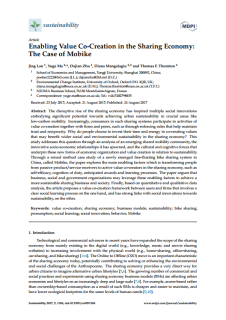
The disruptive rise of the sharing economy has inspired multiple social innovations embodying significant potential towards achieving urban sustainability in crucial areas like low-carbon mobility. Increasingly, consumers in such sharing systems participate in activities of value co-creation together with firms and peers, such as through enforcing rules that help maintain trust and reciprocity. Why do people choose to invest their time and energy in co-creating values that may benefit wider social and environmental sustainability in the sharing economy?
The study "Enabling Value Co-Creation in the Sharing Economy: The Case of Mobike", which has been published in the Open Access Journal Sustainability, addresses this question through an analysis of an emerging shared mobility community, the innovative socio-economic relationships it has spawned, and the cultural and cognitive forces that underpin these new forms of economic organization and value creation in relation to sustainability. Through a mixed method case study of a newly emerged free-floating bike sharing system in China, called Mobike, the paper explores the main enabling factors which is transforming people from passive product/service receivers to active value co-creators in the sharing economy, such as self-efficacy, cognition of duty, anticipated awards and learning processes. The paper argues that business, social and government organizations may leverage these enabling factors to achieve a more sustainable sharing business and society. Finally, based on quantitative and qualitative data analysis, the article proposes a value co-creation framework between users and firms that involves a clear social learning process on the one hand, and has strong links with social innovations towards sustainability, on the other.
